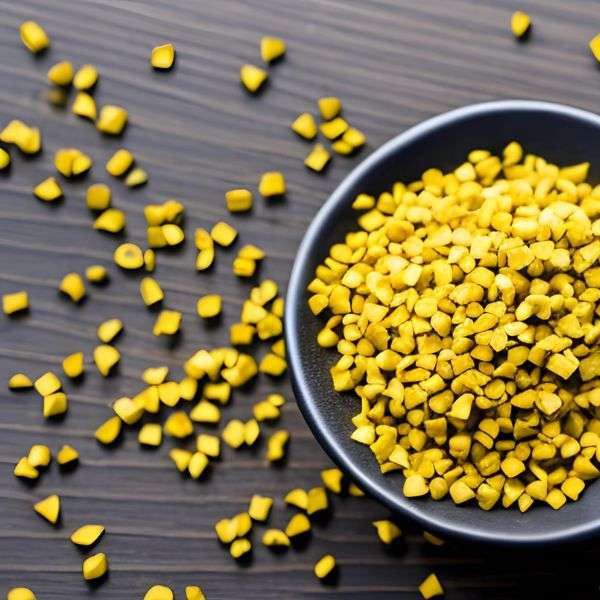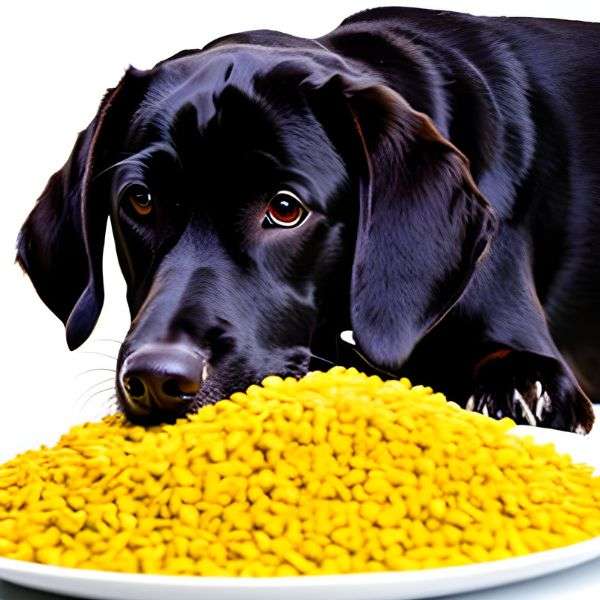Many dog onwners wonder “Can dogs eat fenugreek?” The short answer is Yes, dogs can safely consume fenugreek. Fenugreek is a special herb with a strong smell and is used in both cooking and medicine.
In this article, you will discover the health benefits and potential risks of overfeeding, along with step-by-step instructions on how to introduce fenugreek. Let’s dive in without any further delay!
Understanding About Fenugreek
Fenugreek is an herb that grows in the Mediterranean region and some parts of Asia. The seeds of fenugreek are traditionally used as spices in cooking and medicines. These seeds are small and have a slightly bitter taste.

These are used in curries and pickles to give a special flavor. On the other hand, Fenugreek leaves, also called methi leaves, are used as a fresh herb in some cuisines. Fenugreek is also known as good for health besides being used as an ingredient in cooking.
It contains nutrients like fiber, protein, vitamins (such as vitamins C and B ), minerals (like iron, magnesium, and potassium), and antioxidants.
Can Dogs Eat Fenugreek?
Yes, dogs can eat fenugreek in moderate amounts. Fenugreek seeds are rich in fiber, which can aid in digestion and help with gastrointestinal issues. Additionally, they contain antioxidants that contribute to overall well-being.
Too much fenugreek might lead to digestive upset in dogs. Before adding it into your dogs diet, consult with your veterinarian to make sure it right choice for their specific dietary needs.
Nutritional Composition of Fenugreek
| Nutrient | Amount per 100g |
|---|---|
| Calories | 323 kcal |
| Protein | 23 g |
| Carbohydrates | 58 g |
| Dietary Fiber | 25 g |
| Fat | 6 g |
| Calcium | 176 mg |
| Iron | 33 mg |
| Magnesium | 191 mg |
| Phosphorus | 296 mg |
| Potassium | 770 mg |
| Sodium | 67 mg |
| Vitamin C | 3 mg |
| Vitamin A | 3 IU |
| Vitamin B6 | 0.6 mg |
Please note that these values are approximate and can vary based on factors like the specific variety of fenugreek and how it’s prepared.
Benefits of Fenugreek for Dogs’ Health
The addition of Fenugreek in moderate amounts offers several potential health benefits to dogs. Here are some of them:

Digestive Health Support:
Fenugreek is a good source of nutrients that are good for a dog’s digestive health. It contains soluble fiber, which can assist in regulating your dog’s bowel movements and relieve issues like constipation or diarrhea.
Appetite Stimulation:
If your dog is a picky eater or has a decreased appetite, fenugreek may serve as a natural appetite stimulant. The aromatic compounds of this herb can increase the taste and flavor of the food which can make your dog eat more.
Immune System Boost
Fenugreek has antioxidants and immune-boosting properties that can help your dog stay healthy. These antioxidants fight against harmful substances called free radicals and reduce stress in the dog’s body, which helps in making the immune system stronger.
Anti-Inflammatory Effects
Fenugreek exhibits anti-inflammatory properties, which could be beneficial for dogs with inflammatory conditions like arthritis. However, in this condition, you must talk to the vet before feeding this herb to your dog.
Blood Sugar Regulation
Fenugreek might help control blood sugar levels in humans. However, some pet owners have seen positive results in managing diabetes or insulin resistance in their dogs by eating fenugreek as a treat.
Skin and Coat Health:
Fenugreek has lots of nutrients like vitamins, minerals, and omega-3 fatty acids. These can help to make your dog’s skin healthier and give them a shiny coat. It can also remove dryness, itching, and some skin problems, making their coat look nourished and glossy.
Potential Risks Associated with Fenugreek Consumption for Dogs
While fenugreek offers a lot of potential health benefits, it’s important to be aware of the potential risks and considerations associated with its consumption for dogs. Here are some of them to keep in mind:

Allergic Reactions:
Dogs can have allergies to certain foods, including fenugreek. It’s very common, but if your dog is allergic to fenugreek, it can get skin rashes, itchiness, swelling, upset stomach, or trouble breathing.
Gastrointestinal Upset:
Some dogs may have stomach problems like gas, bloating, or loose stools when they start taking fenugreek. It’s best to introduce fenugreek slowly and watch how your dog reacts. If you think the festive issues of your dog are increasing, then simply stop feeding the fenugreek to your dog.
Medication Interactions:
Fenugreek can react with the medication if your dog is taking it for blood clotting or diabetes. If your dog takes any medications, talk to your vet to find out if it’s safe to give them fenugreek and if any changes to the medication doses are needed.
How to Add Fenugreek to Your Dog Diet?
Here’s a step-by-step guide on how to incorporate fenugreek into your dog’s diet:

Choose the Right Form of Fenugreek
Fenugreek comes in different forms, like seeds, powder, or capsules. When you want to feed this to your dog, first check out what type of fenugreek your dog likes to eat.
If you have fenugreek seeds, you can crush them into a powder using a spice grinder or mortar and pestle. This makes it easier for your dog to eat.
Determine the Appropriate Amount
It’s important to talk to your veterinarian about how much fenugreek to give your dog. The right amount can depend on your dog’s size, age, and any health issues they might have.
Introduce Fenugreek Gradually
To prevent stomach problems, it’s a good idea to introduce fenugreek slowly into your dog’s food. Begin with a small amount and slowly increase it over a few days. This helps your dog’s body get used to the new ingredients and lowers the chances of any negative reactions.
Mix Fenugreek with Food
A simple way to use fenugreek is by mixing it with your dog’s regular food. Begin by adding a small amount of fenugreek powder or crushed seeds to your dog’s meal.
Make sure you mix it well so that it spreads evenly. You can also add a little bit of water or low-sodium broth to make it easier for your dog to eat, like a paste.
Observe Your Dog’s Response
You should keep an eye on the reaction that your dog gives after the fenugreek. Look for any signs of discomfort, allergies, or problems with digestion. If you see any negative reactions, stop giving them fenugreek and talk to your veterinarian for more advice.
Regular Vet Check-ups
Even though fenugreek can be helpful for your dog, it’s important to take them for regular check-ups with the veterinarian.
FAQS
Is fenugreek oil safe for dogs?
Fenugreek oil should be used with caution in dogs and under veterinary guidance. It is not recommended for direct ingestion and should be diluted before topical use.
Does fenugreek increase milk in dogs?
Fenugreek has been linked to increased milk production in some animals, including dogs. However, it’s not clear how effective it is for dogs specifically. It’s best to talk to a vet for advice and guidance on this matter.
Can fenugreek cause gas?
Fenugreek can make some dogs gassy or cause them to pass gas, especially if they eat too much of it. It’s a good idea to start with a small amount of fenugreek and see how your dog reacts to it.
How do I give my dog Fenugreek?
You can give fenugreek to dogs in different ways, like ground seeds, powdered supplements, or in the dog food you buy from the store. It’s important to follow the recommended amount and ask your vet for advice on how to add fenugreek to your dog’s diet.
Conclusion
In conclusion, fenugreek can be safely eaten by your dog and it can give your dog many healthy nutrients.
You can follow the guidelines stated above to safely feed your dog this herb in its diet. You can also talk to the vet for more clear advice and they can guide you according to your dog’s health situation.
So, we hope that you find this article helpful and it clears your doubts regarding fenugreek. If you want to learn more about foods for your dog, you can visit our other articles as well to know the detailed compositions of each food.
Happy Snacking!
